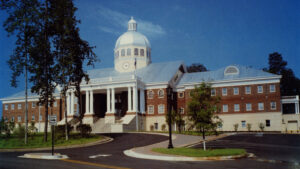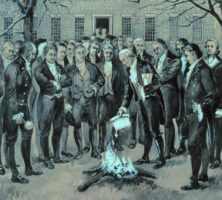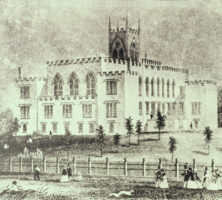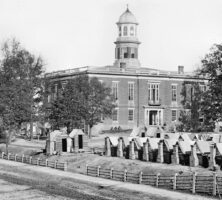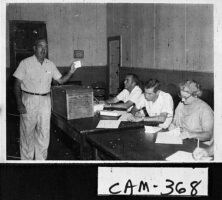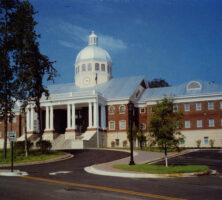The New Georgia Encyclopedia is supported by funding from A More Perfect Union, a special initiative of the National Endowment for the Humanities.
Atlanta has served as the capital city of Georgia since 1868. The current gold-domed capitol building, completed in 1889, houses the General Assembly in downtown Atlanta.
Courtesy of Georgia Info, Digital Library of Georgia.
The New Georgia Encyclopedia does not hold the copyright for this media resource and can neither grant nor deny permission to republish or reproduce the image online or in print. Requests for permission to publish or reproduce the resource may need to be submitted to the Digital Library of Georgia.
Although the precise locations of state legislature meetings in Savannah are not known, this building may have served as one meeting place for the assembly. From 1777 to 1784, Savannah served as the state capital on a rotating basis with Augusta.
The New Georgia Encyclopedia does not hold the copyright for this media resource and can neither grant nor deny permission to republish or reproduce the image online or in print. All requests for permission to publish or reproduce the resource must be submitted to the rights holder.
The burning of the Yazoo Act, which resulted in the Yazoo land fraud of 1795, took place on the grounds of the capitol building in Louisville. Louisville served as the state capital from 1796 until 1806, when the legislature moved to Milledgeville.
The New Georgia Encyclopedia does not hold the copyright for this media resource and can neither grant nor deny permission to republish or reproduce the image online or in print. All requests for permission to publish or reproduce the resource must be submitted to the rights holder.
The state capitol in Milledgeville, pictured circa 1850, housed the General Assembly from 1807 until 1868 and was the site of the state's secession convention in 1861. Known today as the "Old Capitol Building," the structure currently houses Georgia Military College and the Antebellum Capitol Museum.
The New Georgia Encyclopedia does not hold the copyright for this media resource and can neither grant nor deny permission to republish or reproduce the image online or in print. All requests for permission to publish or reproduce the resource must be submitted to the rights holder.
The old Atlanta City Hall, shown here in 1864, served as the first state capitol building in the city during the last half of 1868. Today the current capitol building stands on the site of the old city hall, on a hill in downtown Atlanta.
Courtesy of Library of Congress, Prints and Photographs Division
The New Georgia Encyclopedia does not hold the copyright for this media resource and can neither grant nor deny permission to republish or reproduce the image online or in print. All requests for permission to publish or reproduce the resource must be submitted to the rights holder.
The Kimball Opera House housed the state legislature in Atlanta from 1869 until 1889. Constructed by brothers Edwin N. Kimball and H. I. Kimball, the building was purchased by the state in 1870.
The New Georgia Encyclopedia does not hold the copyright for this media resource and can neither grant nor deny permission to republish or reproduce the image online or in print. Requests for permission to publish or reproduce the resource should be submitted to Special Collections and Archives at Georgia State University.
Election day in Kingsland, Camden County, in the early 1960s, before the advent of voting booths. Georgia's elections were governed by the county unit system, which gave more weight to rural votes than to urban votes, until 1962. Even though they were home to a minority of Georgians, rural counties usually decided the winners of statewide elections.
Courtesy of Georgia Archives, Vanishing Georgia, #
cam368.
The New Georgia Encyclopedia does not hold the copyright for this media resource and can neither grant nor deny permission to republish or reproduce the image online or in print. Requests for permission to publish or reproduce the resource should be submitted to the Georgia Archives.
Griffin Bell, left, with hand raised, is sworn in as U.S. attorney general under President Jimmy Carter (far left) in January 1977. In 1962 Bell headed a judicial panel that ruled Georgia's county unit system of voting to be in violation of the "one man, one vote" principle. His decision forced the change of a system that had been in place since 1917 and had given disproportionate voting power to rural counties.
Photograph from the National Archives and Records Administration
The New Georgia Encyclopedia does not hold the copyright for this media resource and can neither grant nor deny permission to republish or reproduce the image online or in print. All requests for permission to publish or reproduce the resource must be submitted to the rights holder.
The New Georgia Encyclopedia does not hold the copyright for this media resource and can neither grant nor deny permission to republish or reproduce the image online or in print. All requests for permission to publish or reproduce the resource must be submitted to the rights holder.
Madison County government officials moved from the old courthouse to this government complex in 1996.
Photograph by Darby Carl Sanders, New Georgia Encyclopedia
The New Georgia Encyclopedia does not hold the copyright for this media resource and can neither grant nor deny permission to republish or reproduce the image online or in print. All requests for permission to publish or reproduce the resource must be submitted to the rights holder.
Roswell, originally located in Cobb County, lies twenty miles north of Atlanta on the Chattahoochee River. Annexed to Fulton County in 1932, the city today is part of the Atlanta Regional Commission, a member of the Georgia Association of Regional Commissions.
Photograph by Jerry Joiner
The New Georgia Encyclopedia does not hold the copyright for this media resource and can neither grant nor deny permission to republish or reproduce the image online or in print. All requests for permission to publish or reproduce the resource must be submitted to the rights holder.


